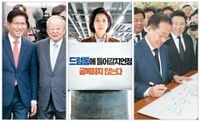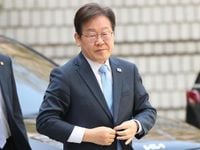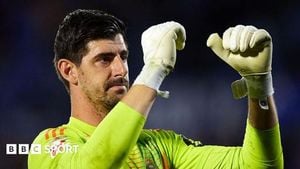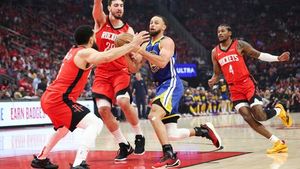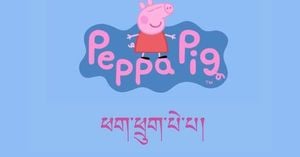Momentum is building for an anti-Lee Jae-myung alliance as discussions intensify among rival parties in South Korea. With just weeks to go before the presidential election on June 3, the prospect of forming a broad coalition to oppose Lee, the former leader of the Democratic Party of Korea (DPK), is increasingly seen as a necessity.
Lee Jae-myung remains the frontrunner in public opinion polls, prompting the conservative People Power Party (PPP) to emphasize the importance of uniting against him. PPP floor leader Kweon Seong-dong stated on April 15, 2025, "We must overcome the Lee Jae-myung faction, who will drive Korea into endless political strife and division." This sentiment echoes across the party as they prepare for the upcoming election.
The call for an anti-Lee coalition gained significant traction following the withdrawal of prominent candidates, including Seoul Mayor Oh Se-hoon and former PPP lawmaker Yoo Seong-min, from the primary race over the weekend. Their exits have allowed former Daegu Mayor Hong Joon-pyo to underscore the necessity of cooperation among conservatives. "If necessary, we can form a coalition government and pursue a new policy of inclusiveness," Hong stated on Tuesday.
Kim Moon-soo, a former employment and labor minister, also voiced his support for uniting against Lee, highlighting the need to include potential candidates from the pro-impeachment camp. He suggested forming alliances with figures like Lee Jun-seok, the Reform Party’s presidential candidate, and former Prime Minister Lee Nak-yon from the Moon Jae-in administration.
However, not everyone in the conservative bloc is on board with the coalition strategy. With only 49 days remaining until the election, some party members believe it's unrealistic to form a united front. Lee Jun-seok, who has been mentioned in discussions about a conservative alliance, expressed his disinterest in coalition talks, reaffirming his intention to run independently.
Amid these discussions, the New Future Democratic Party, led by Lee Nak-yon, is leaving the door open for a potential alliance with the PPP to oppose Lee Jae-myung. Jun Byung-hun, the party's leader, criticized the DPK's recent changes to its primary rules, arguing they increase Lee's chances of winning. He condemned the abolition of the national primary system after 23 years, likening it to totalitarian regimes.
Meanwhile, former DPK lawmaker Kim Du-kwan, who opted not to run in the party's primary due to these rule changes, is contemplating running as an independent or rallying third-party forces instead of aligning with major parties.
As the candidates gear up for the election, they are also focusing on the public opinion polls that will determine the top four candidates for the PPP's nomination. The polls are set to conclude on April 22, 2025, and candidates are making aggressive moves to secure their positions.
Na Kyung-won and Ahn Cheol-soo are among those taking steps to solidify their candidacies. Na, in particular, has been critical of Han Dong-hoon, a former PPP leader, suggesting that he has previously cooperated with the DPK during the impeachment process. Ahn has echoed these sentiments, stating that Han is the easiest opponent for Lee Jae-myung.
In a bid to attract support, Ahn has organized a luncheon meeting with Oh, who has announced he will not run in the primary. Former Minister Kim Moon-soo, along with Representative Na, is also set to meet with Mayor Oh, indicating a strong desire to garner his backing.
The candidates generally agree on the need for a big tent approach to prevent the DPK from gaining power. "I think we have to join forces in any case to win Lee Jae-myung," Kim Moon-soo said, while Hong Joon-pyo emphasized that a united front could also attract support from anti-Lee forces within the DPK.
Despite the urgency of the situation, concerns remain about the feasibility of forming a coalition. Some party members worry that bringing in third-party figures could dilute the party's influence and overshadow the nominee. The focus on a big tent alliance may inadvertently weaken the party's position as they head into the election.
As the political landscape continues to evolve, the discussions surrounding an anti-Lee coalition are likely to shape the upcoming election. The potential for collaboration among rival parties highlights the urgency of the situation and the stakes involved in the race against Lee Jae-myung.
In conclusion, as the election date approaches, the pressure is mounting for conservative candidates to unite and formulate a strategy that can effectively challenge Lee Jae-myung's candidacy. The outcome of these discussions could very well determine the future political landscape of South Korea.
